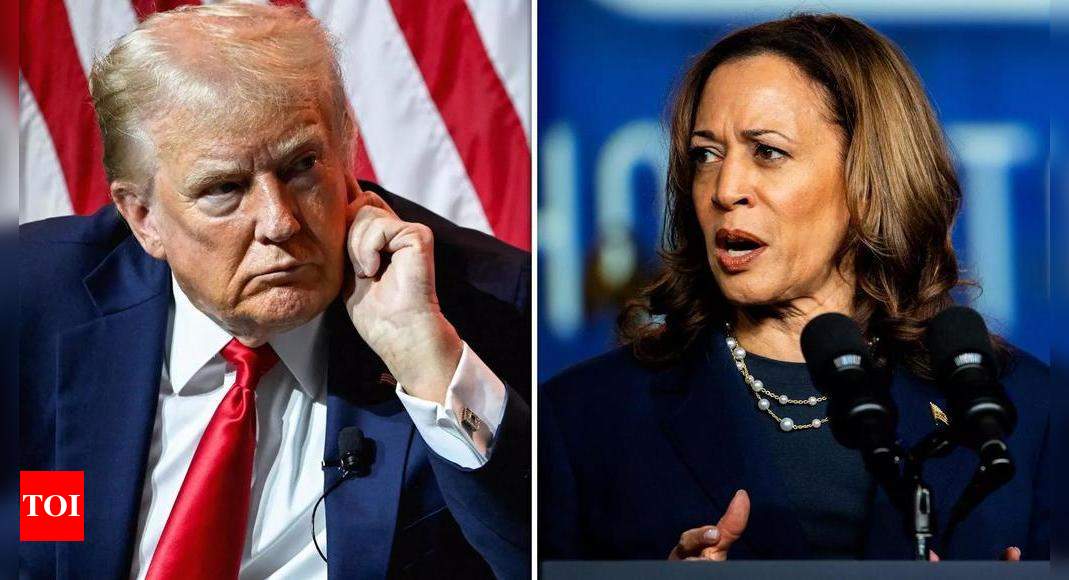
As the 2024 presidential race heats up, Donald Trump has once again stirred controversy with remarks questioning Vice President Kamala Harris‘ racial identity. His comments, suggesting that Harris “turned Black” for political gain, have drawn sharp criticism from Democrats and even sparked discomfort within his own party.
Trump’s racially charged rhetoric has been a hallmark of his political strategy, dating back to his role in the “birther” movement against Barack Obama.However, this latest attack on Harris, who is of Jamaican and Indian descent, appears to be testing the limits of his allies’ patience. Some Republicans, including Sen. Cynthia Lummis, have publicly distanced themselves from the former president’s remarks, warning that such rhetoric is unhelpful and divisive.
Trump doubles down on his comments
Despite the internal pushback, Trump has shown no signs of retreating. He doubled down on his comments, sharing a photo of Harris in traditional Indian attire on social media, further questioning her racial identity. This move seems to contradict advice from within his own campaign, where advisers believe focusing on Harris’ policies rather than her identity would be more effective.
The controversy comes at a pivotal moment in the election cycle, with President Joe Biden having recently ended his re-election bid and endorsed Harris. Trump, who has had to shift his campaign strategy from attacking an aging Biden to facing a younger and more dynamic Harris, appears to be leaning heavily on his familiar playbook of racial division.
‘This could backfire’
While some within the GOP believe that race-based attacks could backfire, particularly among swing voters, others see potential gains in targeting Harris’ identity to appeal to certain segments of the electorate. Diante Johnson, president of the Black Conservative Federation, argues that Trump’s broader focus on economic and social policies might resonate with Black voters, though this strategy is not without risks.
Pollster Frank Luntz notes that gender-based criticisms of Harris might hold some sway, but race-based attacks are likely to be less effective. He warns that such tactics could alienate crucial voters, especially in a race where Trump’s handling of race has been under intense scrutiny.
As the campaign unfolds, Trump’s approach to Harris will likely continue to evolve, shaped by both his instincts and the feedback from within his party. For now, his strategy of questioning Harris’ racial identity reflects a familiar, if controversial, path — one that has defined much of his political career. Whether it will pay off in November remains to be seen.
Trump’s racially charged rhetoric has been a hallmark of his political strategy, dating back to his role in the “birther” movement against Barack Obama.However, this latest attack on Harris, who is of Jamaican and Indian descent, appears to be testing the limits of his allies’ patience. Some Republicans, including Sen. Cynthia Lummis, have publicly distanced themselves from the former president’s remarks, warning that such rhetoric is unhelpful and divisive.
Trump doubles down on his comments
Despite the internal pushback, Trump has shown no signs of retreating. He doubled down on his comments, sharing a photo of Harris in traditional Indian attire on social media, further questioning her racial identity. This move seems to contradict advice from within his own campaign, where advisers believe focusing on Harris’ policies rather than her identity would be more effective.
The controversy comes at a pivotal moment in the election cycle, with President Joe Biden having recently ended his re-election bid and endorsed Harris. Trump, who has had to shift his campaign strategy from attacking an aging Biden to facing a younger and more dynamic Harris, appears to be leaning heavily on his familiar playbook of racial division.
‘This could backfire’
While some within the GOP believe that race-based attacks could backfire, particularly among swing voters, others see potential gains in targeting Harris’ identity to appeal to certain segments of the electorate. Diante Johnson, president of the Black Conservative Federation, argues that Trump’s broader focus on economic and social policies might resonate with Black voters, though this strategy is not without risks.
Pollster Frank Luntz notes that gender-based criticisms of Harris might hold some sway, but race-based attacks are likely to be less effective. He warns that such tactics could alienate crucial voters, especially in a race where Trump’s handling of race has been under intense scrutiny.
As the campaign unfolds, Trump’s approach to Harris will likely continue to evolve, shaped by both his instincts and the feedback from within his party. For now, his strategy of questioning Harris’ racial identity reflects a familiar, if controversial, path — one that has defined much of his political career. Whether it will pay off in November remains to be seen.









